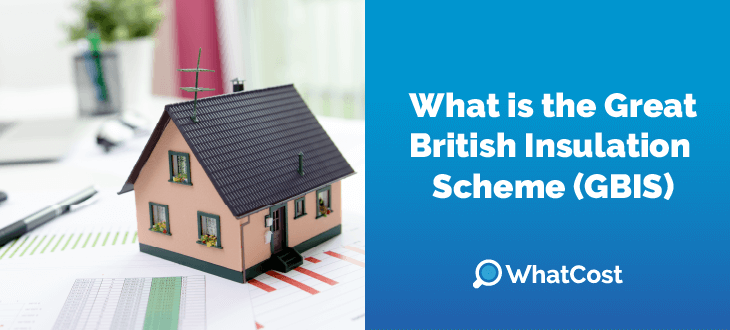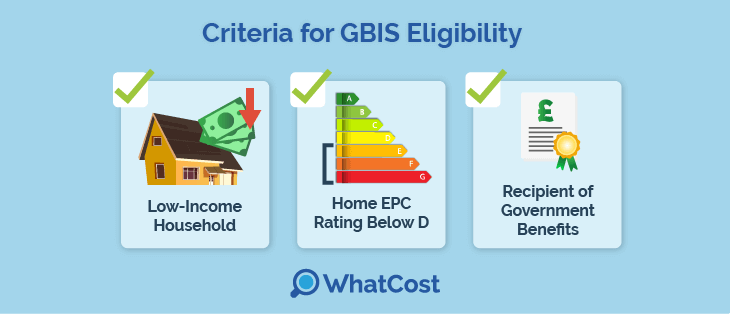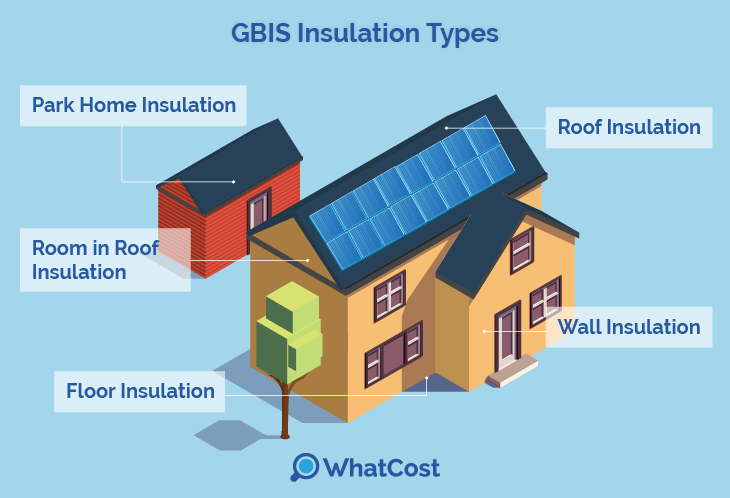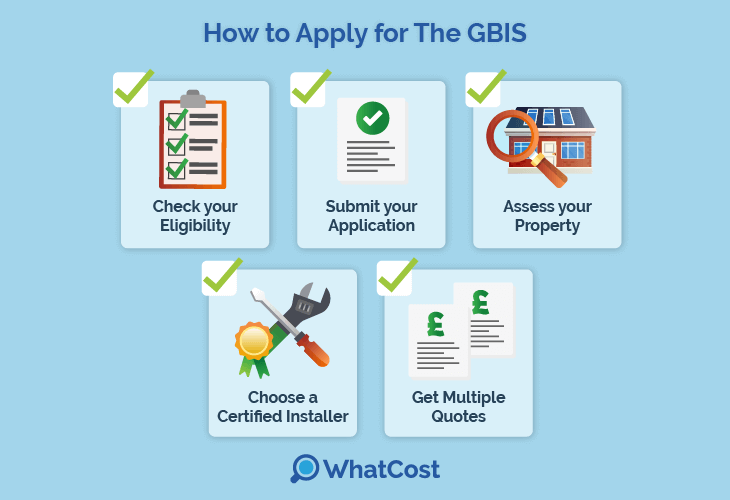Answer these simple questions and we will find you the BEST prices
Which type of solar quotes do you need?
It only takes 30 seconds
100% free with no obligation

Tell us what you need to find a matching specialist

Get free quotes from professionals near you

Compare offers and choose the one that best matches your need
A Complete Guide to the Great British Insulation Scheme (2026)


- The Great British Insulation Scheme (GBIS) is a UK government initiative aimed at assisting fuel-poor and energy-inefficient households with insulation upgrades.
- Qualifying households can apply to benefit from the GBIS scheme until March 2026.
- The Warm Homes Plan is scheduled to take over from April 2025 as a streamlined national funding model for energy efficiency and low-carbon heating upgrades.
The UK is facing a growing energy crisis, with soaring costs and inefficiently insulated homes making winters difficult. The Great British Insulation Scheme (GBIS) is a government initiative designed to address this issue by providing funding for home insulation upgrades.
With the ambitious Net Zero by 2050 goal in place, the GBIS government home insulation scheme will soon be incorporated under the Warm Homes Plan, a parent scheme aimed at streamlining the application process and broadening financial support to qualifying homes.
This ultimate guide by WhatCost will delve into the eligibility criteria, application process, and benefits of the GBIS home insulation scheme, as well as what to expect in the future.
Ready to insulate your home? WhatCost is here to land you the best bargains! Instead of spending endless hours researching and vetting potential installers, spend just 30 seconds filling out our online intake form, and receive up to 3 home-tailored quotes. The best part? It’s all completely free and without obligations. Simply click below to begin!
What is the purpose of the Great British Insulation Scheme?
The Great British Insulation Scheme (GBIS) - formerly called ECO+ - has been administered by the Office of Gas and Electricity Markets (Ofgem) since July 2023 as a nationwide effort to improve the thermal efficiency of the UK housing stock. The government scheme for insulation does so by providing extensive financial assistance to low-income, fuel-poor and energy-inefficient homes to install effective domestic insulation measures.
The scheme provides full and partial cost coverage for a range of home insulation products, most notable for loft insulation and wall insulation grants on account of the majority of home heat loss occurring through these avenues.
Unlike its counterpart scheme - the Energy Company Obligation (ECO4) - this government house insulation scheme provides only one home upgrade per qualifying household, designed to maximise the scheme's nationwide reach and improve the overall housing stock.
How can you benefit from the government insulation scheme?

The Great British Insulation Scheme (GBIS) provides extensive financial coverage for home insulation upgrades. In turn, these upgrades will significantly improve your quality of life, financial savings, and even environmental surroundings.
Here are just some of the benefits you could enjoy through this insulation grant:
- Reduced energy bills: Complete insulation can reduce your home's heat loss by up to 60%, saving you more than £650 on your annual energy bills. Through the GBIS, you can benefit from one key insulation coverage to get the savings started.
- Less CO2 emissions: Efficient home insulation can reduce your domestic carbon emissions by up to 1.7 tonnes yearly, contributing to a healthier planet and home environment as well.
- Better health: Homes suffering from moisture and condensation issues breed mould and rot. Not only does this harm your home’s structural integrity, but it can also pose risks to your health through respiratory illnesses and asthma. Insulated homes maintain a balanced inner climate that protects your well-being.
- Higher property value: Homes with effective insulation generally have a better market value. Due to a higher Energy Performance Certificate (EPC) score, your home will likely be more attractive to potential buyers and renters.
Ultimately, grant-based home insulation will allow you to enjoy all of these benefits at little to no personal cost. To ensure everything is up to standard, you must work with a PAS 2030-2035 registered installer, which helps guarantee that you receive quality workmanship.
Who is eligible for the Great British Insulation Scheme?

Great British Insulation Scheme eligibility focuses on a series of criteria relating to your financial circumstances and existing home efficiency. Qualifying individuals can get full or partial cost coverage of a home insulation approach decided after an assessment.
Your qualification for the grant will hinge on factors such as your home's Energy Performance Certificate (EPC) rating, whether you are a recipient of government assistance and other indicators. Let’s have a closer look at each one:
Low-income households
To qualify as a low-income household, your annual gross income must be less than £31,000, or you must be in a specific council tax band (A - D in England, A - E in Scotland and Wales).
Pensioners and individuals over 70 may also qualify for free insulation, even if they don't meet the standard income or council tax band criteria. For example, individuals in the correct economic groupings can receive free loft insulation for pensioners, amongst other measures.
These individuals can be categorized into two key income groups:
Low-income group:
- Annual gross income below £31,000.
- Home EPC rating below D (private renters), or below C (homeowners).
- Recipient of means-tested benefits.
- Social housing residents who are vulnerable to cold conditions (e.g. age, diagnosis).
General group:
- Homeowners who live in council tax band A – D in England, or A – E in Scotland and Wales, AND have an EPC rating of D or below.
EPC rating of D or below
An Energy Performance Certificate (EPC) rating is an official grading system that measures how energy-efficient your property is. The grading scale ranges from A (most efficient) to G (least efficient).
The EPC rating qualification range differs depending on whether you own or rent your home:
Private home renters: EPC rating of D or E.
Homeowners: EPC rating of D to G.
All homes come with an EPC rating; however, if you do not know the EPC rating of your property, you can arrange an inspection via accredited housing organisations from the official UK government website.
Households that receive at least one benefit
Homeowners who receive financial allowances or assistance from the government are often prioritised for grant support. The current qualifying benefits that are recognised as eligible are as follows:
- Income-based Job Seekers Allowance
- Income-related Employment and Support Allowance (ESA)
- Income Support
- Pension Credit
- Guarantee Credit
- Working Tax Credit
- Child Tax Credit
- Universal Credit
- Housing Benefit
What types of insulation are available under the GBIS scheme?

The Great British Insulation Scheme (GBIS) is designed to make your home more energy-efficient. After a thorough home assessment, you could receive funding for various insulation upgrades, including:
- Wall insulation: This can involve cavity wall insulation insulation grants, external wall insulation, or solid wall insulation, depending on your home's construction.
- Roof insulation: Whether you have a loft, a flat roof, or a pitched roof, there are insulation options to improve heat retention through loft insulation grants and more.
- Floor insulation: Underfloor and solid floor insulation are both provided depending on your home's build.
- Park home insulation: Specific insulation solutions are available for park homes to enhance energy efficiency.
- Room-in-roof insulation: If you have a converted loft, this type of insulation can significantly improve your home's thermal performance.
The exact type and level of funding you receive will be determined by your energy provider, taking into account factors like your home's age, size, and current insulation levels.
How can you apply for the government insulation scheme?

You can apply for the Great British Insulation Scheme (GBIS) by visiting the official UK government portal for more information. The GBIS scheme is currently accepting new applicants until March 2026, but it’s recommended to apply as early as possible.
There are a series of energy providers throughout the UK who can administer insulation via the Great British Insulation Scheme (GBIS). Some of these are:
- E.ON Great British Insulation Scheme
- EDF Great British Insulation Scheme
- Octopus Great British Insulation Scheme
- OVO Great British Insulation Scheme
This is not an exhaustive list and there are plenty more energy providers capable of administering insulation upgrades. Here’s what to expect for the application process:
- Check your eligibility: Before you start, use the government's eligibility checker to see if you qualify. It's a quick and easy way to determine if you're eligible for the scheme.
- Submit your application: Once you've confirmed your eligibility, fill out the online application form provided on the official UK government website.
- Assess your property: After you've submitted your application, a representative from the scheme will contact you to arrange a property assessment. This assessment will help determine the specific insulation measures needed for your home.
- Choose a certified installer: To ensure high-quality work, it's essential to choose a PAS 2030-2035 certified installer. These installers are qualified to carry out energy-efficient home improvements, including insulation.
- Get multiple quotes: To get the best deal, it's always a good idea to get quotes from multiple installers. Compare prices and services to find the right fit for your needs and budget.
From April 2025 onwards, the UK will roll out its new Warm Homes Plan, a catch-all scheme aimed to streamline the funding model and broaden the reach of support. The plan will run for 3 to 5 years and covers two key forms of support:
- Energy performance: Up to £15,000 per property for energy performance upgrades like insulation, draught-proofing, and glazing.
- Low-carbon heating: Another £15,000 is allocated for low-carbon heating systems, particularly for off-gas homes.
Local authorities will be responsible for administering the grant.
While the application process for the GBIS scheme may seem straightforward, finding a professional installer is much more difficult to do, often requiring countless hours of surfing websites and scheduling phone calls. Luckily, WhatCost can take care of it all!
All we need is 30 seconds of your time to fill out our intake form, and we’ll send you up to 3 free home-tailored quotes directly from our nationwide network of pre-vetted installers. No costs or obligations apply. Simply click below to begin and let the bargains come to you!
FAQ
The main individuals who qualify for the GBIS scheme are those qualified as low-income earners. This is either by having a gross annual income under £31,000 or being in council tax bands A – D in England, or A – E in Scotland and Wales.
The ECO+ scheme is the former name of the Great British Insulation Scheme (GBIS), meaning the eligibility criteria remain the same. Low-income households, homes with poor EPC ratings, recipients of government benefits, and pensioners may qualify for benefits.
An Energy Performance Certificate (EPC) is a grading system that measures the energy efficiency of your home. Scores range from A (most efficient) to G (least efficient) and determine the heat loss experienced in your home.
You can apply for the Great British Insulation Scheme (GBIS) through the official UK government portal dedicated to the scheme.
The GBIS scheme is available via Octopus for private rental properties. Applicants must meet the standard eligibility criteria, gain permission from their landlord, and then apply for the Great British Insulation Scheme (GBIS).

Akif has a keen interest in green home improvement solutions and the role of digital media in identifying climate trends. He aims to provide a multidisciplinary approach to content rooted in credible research and accuracy.
